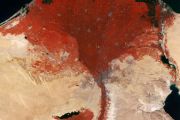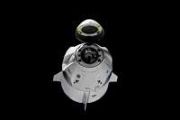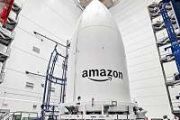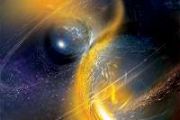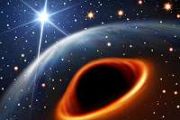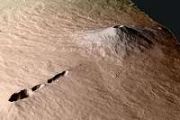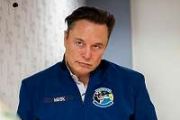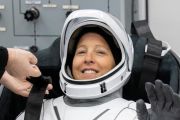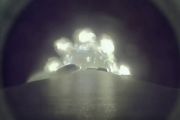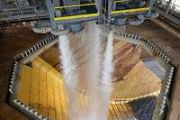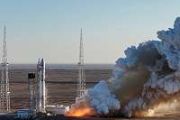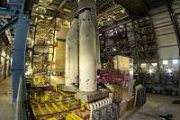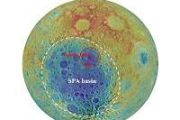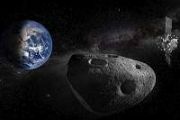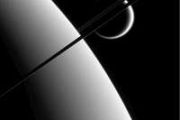
Copernical Team
HawkEye 360 prepares dual satellite clusters for spring SpaceX launch
 HawkEye 360 Inc., a prominent defense technology company specializing in space-based radio frequency (RF) data and analytics, has announced the upcoming spring launch of its clusters 8 and 9. This launch marks the company's first simultaneous placement of two satellite clusters into orbit. The six satellites of clusters 8 and 9 will be launched aboard SpaceX's Bandwagon-1 Rideshare mission from
HawkEye 360 Inc., a prominent defense technology company specializing in space-based radio frequency (RF) data and analytics, has announced the upcoming spring launch of its clusters 8 and 9. This launch marks the company's first simultaneous placement of two satellite clusters into orbit. The six satellites of clusters 8 and 9 will be launched aboard SpaceX's Bandwagon-1 Rideshare mission from SpaceBilt and Phison Skyrocket to International Space Station in 2025
 SpaceBilt Inc., has partnered with Phison to fly the Large in Space Server (LiSS), the world's first 100 terabyte plus data storage and edge compute center to the International Space Station (ISS) in 2025. The LiSS will be flight qualified on the Japanese Kibo External Facility on the SpaceBD iSEEP platform to ensure its readiness to withstand the space environment. SpaceBilt and partner Novium
SpaceBilt Inc., has partnered with Phison to fly the Large in Space Server (LiSS), the world's first 100 terabyte plus data storage and edge compute center to the International Space Station (ISS) in 2025. The LiSS will be flight qualified on the Japanese Kibo External Facility on the SpaceBD iSEEP platform to ensure its readiness to withstand the space environment. SpaceBilt and partner Novium Axient establishes subsidiary in the Netherlands to enhance European aerospace and defense presence
 Axient LLC (Axient) has announced the opening of its first international office and the establishment of a wholly owned subsidiary, Axient Systems B.V. (Axient Systems), in Delft, Netherlands. This expansion is a part of Axient's ongoing effort to strengthen its relationships with several technical organizations in the Netherlands over the past two years.
These partnerships include a colla
Axient LLC (Axient) has announced the opening of its first international office and the establishment of a wholly owned subsidiary, Axient Systems B.V. (Axient Systems), in Delft, Netherlands. This expansion is a part of Axient's ongoing effort to strengthen its relationships with several technical organizations in the Netherlands over the past two years.
These partnerships include a colla 'Spectacular' total eclipse leaves North Americans spellbound
 Eclipse mania gripped North America on Monday as a breathtaking celestial spectacle captivated tens of millions of people, offering a rare blend of scientific interest, commercial opportunity and daytime partying.
The Moon's shadow plunged the Pacific coast of Mexico into total darkness at 11:07 am local time (1807 GMT) then swept across the United States at supersonic speed, returning to th
Eclipse mania gripped North America on Monday as a breathtaking celestial spectacle captivated tens of millions of people, offering a rare blend of scientific interest, commercial opportunity and daytime partying.
The Moon's shadow plunged the Pacific coast of Mexico into total darkness at 11:07 am local time (1807 GMT) then swept across the United States at supersonic speed, returning to th China, Thailand to cooperate in lunar exploration missions
 China and Thailand will cooperate on the exploration and peaceful use of outer space as well as on the International Lunar Research Station, according to two memorandums of understanding (MoUs) signed Friday in Beijing.
China National Space Administration (CNSA) and the Ministry of Higher Education, Science, Research and Innovation of Thailand signed the two MoUs.
China's Chang'e-7 l
China and Thailand will cooperate on the exploration and peaceful use of outer space as well as on the International Lunar Research Station, according to two memorandums of understanding (MoUs) signed Friday in Beijing.
China National Space Administration (CNSA) and the Ministry of Higher Education, Science, Research and Innovation of Thailand signed the two MoUs.
China's Chang'e-7 l Climate warming endangers Antarctic meteorite collection
 Using artificial intelligence, satellite observations, and climate model projections, a team of researchers from Switzerland and Belgium calculate that for every tenth of a degree of increase in global air temperature, an average of nearly 9,000 meteorites disappear from the surface of the ice sheet. This loss has major implications, as meteorites are unique samples of extraterrestrial bodies th
Using artificial intelligence, satellite observations, and climate model projections, a team of researchers from Switzerland and Belgium calculate that for every tenth of a degree of increase in global air temperature, an average of nearly 9,000 meteorites disappear from the surface of the ice sheet. This loss has major implications, as meteorites are unique samples of extraterrestrial bodies th Private space company, Taobao team up to test rocket-powered deliveries
 A private Chinese commercial rocket developer, Beijing Sepoch Technology Co, is exploring the use of reusable rocket technology for expedited delivery services in a joint research project with Alibaba's Taobao e-commerce platform.
The first test of cargo recovery from a rocket is planned for this year. If successful, the initiative could enable e-commerce packages to travel intercontinenta
A private Chinese commercial rocket developer, Beijing Sepoch Technology Co, is exploring the use of reusable rocket technology for expedited delivery services in a joint research project with Alibaba's Taobao e-commerce platform.
The first test of cargo recovery from a rocket is planned for this year. If successful, the initiative could enable e-commerce packages to travel intercontinenta MDA Space Defines The Next Generation Of Robotics With New MDA Skymaker Product Line
 MDA Space (TSX: MDA), a trusted mission partner to the rapidly expanding global space industry, has announced MDA SKYMAKERTM, a new suite of space robotics purpose-built to meet the diverse needs of our customers' most ambitious missions. Unveiled at the Space Symposium conference in Colorado Springs, MDA SKYMAKERTM, the world's leading space robotics technology and services, is now available fo
MDA Space (TSX: MDA), a trusted mission partner to the rapidly expanding global space industry, has announced MDA SKYMAKERTM, a new suite of space robotics purpose-built to meet the diverse needs of our customers' most ambitious missions. Unveiled at the Space Symposium conference in Colorado Springs, MDA SKYMAKERTM, the world's leading space robotics technology and services, is now available fo UK Space Agency allocates 13 million pounds to international space projects
 The UK Space Agency's International Bilateral Fund is focused on supporting the UK space sector to work directly with international partners on exciting and innovative projects. It is funding, amongst others, the University of Strathclyde to work with organisations including MIT and the Alan Turing Institute to use Artificial Intelligence to improve space operations, safety and sustainability.
The UK Space Agency's International Bilateral Fund is focused on supporting the UK space sector to work directly with international partners on exciting and innovative projects. It is funding, amongst others, the University of Strathclyde to work with organisations including MIT and the Alan Turing Institute to use Artificial Intelligence to improve space operations, safety and sustainability. Zenno Astronautics collaborates with Faraday Factory Japan on space-bound superconducting magnets
 New Zealand headquartered space-flight systems company Zenno Astronautics (Zenno), a developer of world-first superconducting electromagnets for space applications, and Faraday Factory Japan LLC, the world's leading superconducting tape maker, have partnered to collaborate on the development of bespoke high-temperature superconductor (HTS) magnets for space applications.
Zenno and Faraday
New Zealand headquartered space-flight systems company Zenno Astronautics (Zenno), a developer of world-first superconducting electromagnets for space applications, and Faraday Factory Japan LLC, the world's leading superconducting tape maker, have partnered to collaborate on the development of bespoke high-temperature superconductor (HTS) magnets for space applications.
Zenno and Faraday 





